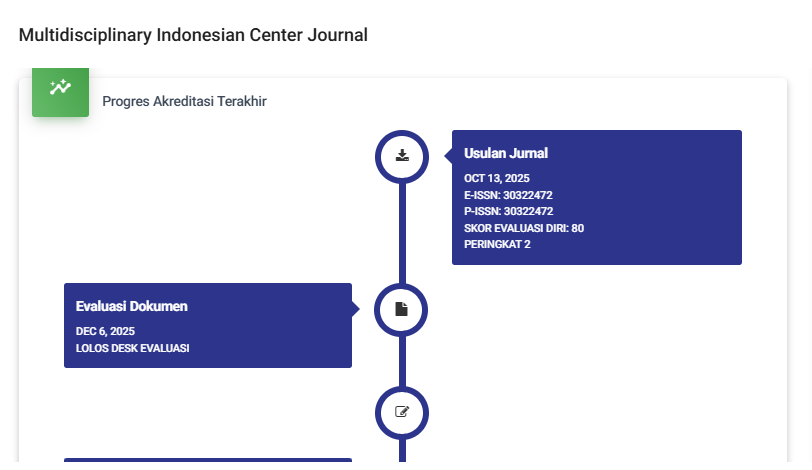MANAJERIAL COMPETENCE OF MADRASAH PRINCIPALS IN BUILDING STAKEHOLDER COMMITMENT TO THE QUALITY OF MADRASAH ALIYAH IN RIAU PROVINCE
DOI:
https://doi.org/10.62567/micjo.v2i2.646Keywords:
Managerial Competence, Commitment, Madrasah Quality, Madrasah AliyahAbstract
This study aims to examine the managerial competencies of madrasah principals, their commitment to fostering stakeholder commitment, and the collective commitment of both principals and stakeholders to the quality of Madrasah Aliyah. The usefulness of this research is to enrich the scientific paradigm in the field of Islamic Education Management, specifically in the study of Human Resource Management.This research is qualitative, employing interviews and observations as its methods. The research informants consist of madrasah principals and stakeholders, particularly educators and education staff at Madrasah Aliyah in Riau Province. Data collection techniques include interviews and observations, using data collection instruments as interview guidelines. The collected data is then analyzed.The findings of the study are as follows:(1) The planning conducted by the madrasah principal involves policy formulation through deliberations, discussions, and meetings with stakeholders, including vice principals, educators, education staff, and even parents, during the planning, implementation, and evaluation stages. Policies to enhance the competency and commitment of principals and educators are implemented through workshops, training sessions, and seminars.(2) The organization of work procedures by the madrasah principal includes direct coordination with teachers, delegation of duties to vice principals, clear job specifications, and structured task distribution based on the organizational hierarchy.(3) The management of stakeholder performance, particularly educators and education staff, focuses on self-competence, commitment, self-motivation, perseverance, humanity, economic factors, salaries, certifications, and effective leadership by the madrasah principal, including teacher development programs.(4) The supervision of stakeholder performance by the madrasah principal follows an open system monitoring model, which includes input, process, output, and outcome. The input refers to educators with at least a bachelor's or master's degree specializing in the required field of education. The process involves training, education, and supervision by the principal. The output is reflected in the quality of services provided to both internal and external stakeholders of the madrasah. The outcome is the achievement of organizational goals and the improvement of madrasah quality.Based on the research findings, it is concluded that the managerial competencies of madrasah principals enhance the commitment of Madrasah Aliyah stakeholders in Riau Province. Recommendations are proposed to the Provincial and District Education Offices to develop training programs for madrasah principals and stakeholders.
Downloads
References
Ahmad Rozikun dan Najamuddin, Strategi Perencanaan Manajemen Berbasis Madarasah (MBM) di Tingkat Menengah (Jakarta: Lista Fariska Putra, 2008)
Asrulla, Asrulla, Kasful Anwar, and M. Y. Mahmud. "Membangun Competitive Advantage Sekolah Dalam Menghadapi Tantangan Globalisasi Pendidikan."Jurnal Genta Mulia15, no. 2 (2024): 1-10.
Asrulla, Asrulla, Marwazi Marwazi, Abdul Halim, and Firdaus Jeka. "Meneropong Eksistensi Pendidikan Pesantren melalui Undang-Undang No. 18 Tahun 2019."Innovative: Journal Of Social Science Research4, no. 4 (2024): 9582-9596.
Asrulla, Asrulla, Risnita Risnita, M. Syahran Jailani, and Firdaus Jeka. "Populasi dan sampling (kuantitatif), serta pemilihan informan kunci (kualitatif) dalam pendekatan praktis."Jurnal Pendidikan Tambusai7, no. 3 (2023): 26320-26332.
Asrulla, Asrulla, Tuti Indriyani, and Firdaus Jeka. "Tantangan Manajemen Sumber Daya Manusia Dalam Pendidikan Era Society 5.0."Jurnal Genta Mulia15, no. 1 (2024): 161-178.
Asrulla, Asrulla. "Pengaruh Pelatihan, Pengalaman Kerja, dan Reward terhadap Kinerja Tenaga Pendidik Pada Direktorat Pendidikan Nurul Islam Group Batam."Indonesian Journal of Islamic Educational Management5, no. 1 (2022): 35-45.
Atmodiwirio. Manajemen Pelatihan, ( Jakarta: PT. Pustaka, 2002)
Burhanudin dan Sunyoto, Perilaku Organisasi (Yogyakarta: CAPS, 2015)
Center for Public Mental Health, “Sinergi Pemangku Kepentingan sebagai Kunci Keberhasilan Sekolah Sejahtera”, 18 Juli 2020, 22.14, https://cpmh.psikologi.ugm. ac.id/2020/07/18/
E Mulyasa, Manajemen dan Kepemimpinan Kepala Sekolah , (Jakarta, PT Bumi Aksara , 2011)
Edward Sallis, Total Quality Management in Education. (London: Kogan Page, 2006)
Eriyanto, (2014), Kompetensi Manajerial Kepala Sekolah Dalam Peningkatan Kinerja Guru; ( Jurnal Lisan Al-Hal, 2014 ), Volume 6, No. 2
H. Malayu Hasibuan, Manajemen Sumber Daya Manusia, Edisi Revisi, (Jakarta: Bumi Aksara, 2009)
Kartini Kartono, Pemimpin dan Kepemimpinan, (Jakarta: Rajawali, 1986)
Karwati, Euis, dan Priansa. Kinerja dan Profesionalisme Kepala Sekolah, ( Bandung: Alfabeta, 2013)
Lexy J. Moleong, Metodologi Penelitian Kualitatif, (Bandung: Remaja Rosdakarya, 2017)
M. Ma‟ruf Abdullah, Manajemen Bisnis Syariah (Yogyakarta: Aswaja Pressindo, 2014)
Matthew B. Miles and Michael Huberman, Qualitative Data Analisyas, (London: Beverly Hills, 2020)
Miles, Matthew B. and Michael Huberman, Qualitative Data Analisys, London: Beverly Hills, 2020.
Moehariono, Pengukuran Kinerja Berbasis Kompetensi (Jakarta: Rajawali Pers, 2014)
Moleong, Lexy J., Metodologi Penelitian Kualitatif, Bandung: Remaja Rosdakarya, 2017.
Downloads
Published
How to Cite
Issue
Section
License
Copyright (c) 2025 Sudur, Kasful Anwar Us, Kemas Imron Rosadi, Asrulla

This work is licensed under a Creative Commons Attribution-ShareAlike 4.0 International License.



























